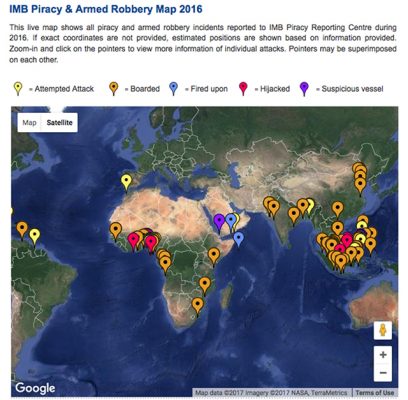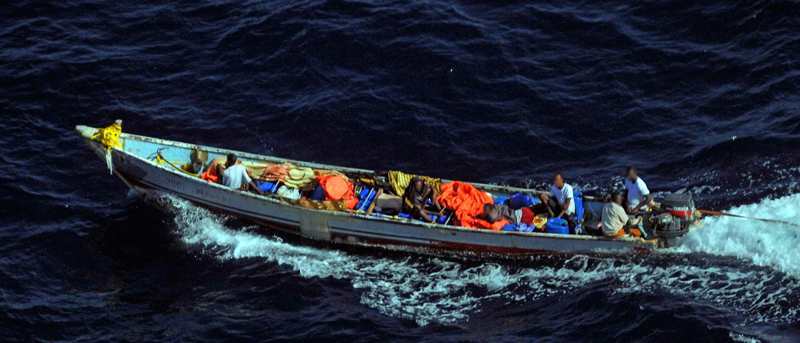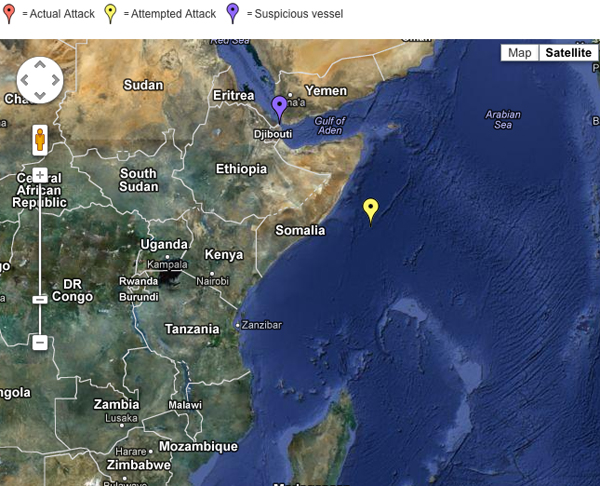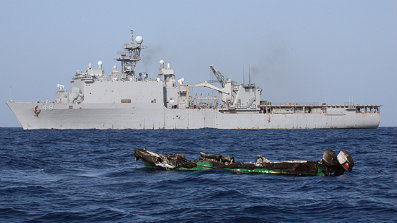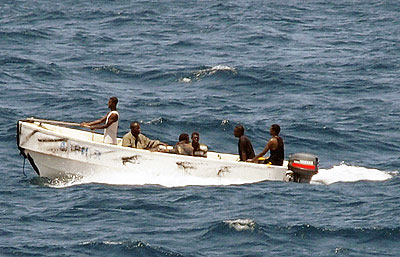The Royal Yachting Association (RYA) is reminding the boating community to remain vigilant and to avoid navigating through waters in which pirates are known to operate
More crew were kidnapped at sea in 2016 than in any of the previous 10 years, despite global piracy reaching its lowest levels since 1998, the ICC International Maritime Bureau’s (IMB) annual piracy report has revealed.
In its 2016 report, IMB recorded 191 incidents of piracy and armed robbery on the world’s seas.
‘The continued fall in piracy is good news, but certain shipping routes remain dangerous, and the escalation of crew kidnapping is a worrying trend in some emerging areas,’ said Pottengal Mukundan, director of IMB whose Piracy Reporting Centre (PRC) has monitored world piracy since 1991.
Maritime kidnappings on the rise
Worldwide in 2016, 150 vessels were boarded, 12 vessels were fired upon, seven were hijacked, and 22 attacks were thwarted. The number of hostages fell to 151.
Maritime kidnappings, however, showed a threefold increase on 2015. Pirates kidnapped 62 people for ransom in 15 separate incidents in 2016. Just over half were captured off West Africa, while 28 were kidnapped from tugs, barges, fishing boats, and more recently merchant ships, around Malaysia and Indonesia.
IMB is urging governments to investigate and identify the kidnappers and punish them under law.
Mr Mukundan said the boating community should stay vigilant in high-risk areas. ‘Shipmasters should follow the latest best management practices and where possible take early action to avoid being boarded. They should inform the IMB PRC or regional counter piracy centres for help and advice,’ he said.
Sulu Sea kidnappings
The kidnapping of crew from ocean going merchant vessels in the Sulu Sea and their transfer to the Southern Philippines represents a notable escalation in attacks.
In the last quarter, 12 crew were kidnapped from two cargo vessels underway and an anchored fishing vessel, and in November a bulk carrier was fired upon but pirates were not able to board the vessel. Earlier in 2016, crew members were kidnapped in three attacks on vulnerable slow-moving tugs and barges.
IMB advises charterers and owners to consider avoiding the Sulu Sea by routing vessels West of Kalimantan.
Nigeria hotspot
The Gulf of Guinea remained a kidnap hotspot in 2016, with 34 crew taken in nine separate incidents. Three vessels were hijacked in the region. There was a noticeable increase in attacks reported off Nigeria: 36 incidents in 2016, up from 14 in 2015. These included nine of the 12 vessels fired upon worldwide in 2016. Some were almost 100 nautical miles from the coastline.
Meanwhile, Indonesian piracy incidents fell from 108 in 2015 to 49 in 2016. Although the overwhelming majority were low-level thefts, vessels were boarded in all but three of the incidents.
IMB recorded two incidents off Somalia. Pirates attempted to attack a container vessel in the Gulf of Aden in May, and fired on a product tanker in the Somali basin some 300 nm from shore in October. For IMB, this latest incident demonstrates that the capacity and intent to attack merchant shipping still exists off Somalia.
Remain vigilant

Stuart Carruthers
Royal Yachting Association (RYA) cruising manager, Stuart Carruthers, said: ‘While defensive measures and the use of armed guards on commercial shipping have had a clear deterrent effect, pirate networks still retain both the intent and capability to conduct piracy. Sailing vessels which are slow and low remain vulnerable from opportunistic attacks and hijackings.
‘Whilst merchant vessels are able to implement self-protection measures and employ armed guards to protect them, a sailing vessel cannot and it is the crews that are valuable targets of maritime crime.
‘We would urge the boating community to remain vigilant and to avoid navigating through waters in which pirates are known to operate.
‘Theft from boats can occasionally lead to violent armed attacks if the owners are on board with the intruders. Personal security and safety must always be given due consideration – even in areas that are usually frequented by boaters and are widely considered to be safe.
‘We recommend checking the travel advice on the Foreign and Commonwealth Office website for guidance.’
Biggest drop in piracy at sea since 2007
'The single biggest reason for the drop in worldwide piracy is the decrease in Somali piracy', says International Maritime Bureau…
Naval Forces renew piracy warning to yachts
The High Risk Area is the Southern Red Sea, Gulf of Aden and Western Indian Ocean
Piracy warning for yachtsmen
There is a 'real risk of being attacked and pirated for ransom' along the east coast of Africa off Somalia
Insurers to set up ‘private navy’ to combat piracy
Armed patrol boats will help lower insurance costs
Upsurge in piracy leads to ISAF/CA advice reissue
Download latest version of CA/ISAF advice
Download CA piracy feature
In-depth guide for cruisers
Anti-piracy planning chart – free download
Downloadable UKHO planning chart shows transit corridor through Gulf Of Aden
At 16, Laura Dekker sails round the world
But youngest-ever circumnavigator won't get official recognition
Hijacking off Yemen: French yachtsman dead, wife saved
Spanish warship storms pirate skiff, others may be missing
Danish pirate hostages released
Family held for 6 months
Pirates get life sentences
Two 'Quest' killers convicted, more to come
Danish yacht seized by pirates off Oman
Three children on board Somali pirates' latest capture
Warning after sailing vessels targeted by armed pirates
Two incidents of armed piracy against sailing vessels reported in the Caribbean in the last 10 days have prompted an…
Pirate given 12 life sentences over sailors’ killings
'Most senior pirate ever captured'
Royal Navy frees Somali pirates’ hostages
HMS Cornwall rescues five fishermen from pirate mothership
Daughter sails to safety after father murdered by pirates
Ship rescue after terrifying ordeal
Skipper escapes capture by pirates, but crew held
Yacht ran aground, skipper rescued by EU warship




